Iran
Iranian Supreme Leader Ayatollah Ali Khamenei stated on Wednesday that a record low turnout in the presidential elections did not indicate opposition to the ruling system by non-voters.
Over 60% of eligible voters abstained, marking the lowest turnout in the history of the Islamic Republic.
A run-off election will be held on Friday to choose a successor to the late President Ebrahim Raisi, who passed away in a helicopter crash in May.
"Of course, in the first round of the elections, people's participation was not as high as one expects. It was lower than we expected and anticipated," said Ayatollah Ali Khamenei, Iran's supreme leader.
Now, hard-line former nuclear negotiator Saeed Jalili faces the reformist Masoud Pezeshkian, a heart surgeon who likely needs a widespread turnout to win the presidency. Pezeshkian's supporters warn of dark days ahead under Jalili. Meanwhile, many people are unconvinced that their vote even matters.
“I did not vote and I will not, since nobody apologized because of Mahsa and later miseries that young people face, neither the reformists nor the hard-liners," said Leila Seyyedi, a 23-year-old university student studying graphic design.
Iranian election law requires a candidate to get over 50% of the vote to avoid a runoff. In results released Saturday, Pezeshkian got 10.4 million votes while Jalili received 9.4 million. Parliament speaker Mohammad Bagher Qalibaf came in third with 3.3 million, while Shiite cleric Mostafa Pourmohammadi had over 206,000.
Most voters for Qalibaf, a former general in Iran's paramilitary Revolutionary Guard and national police chief known for his crackdowns against students and for corruption allegations, likely will break for Jalili after Qalibaf endorsed him, analysts say. That has put Jalili, a 58-year-old known as the “Living Martyr” for losing a leg in the 1980s Iran-Iraq war, in the lead position for the runoff.
But his recalcitrant reputation among Western diplomats during negotiations over Iran's nuclear program is paired with concern at home over his views. One politician who has aligned himself with the moderates, former Iranian Information and Communications Technology Minister Mohammad Javad Azari Jahromi, put the choice between Jalili and Pezeshkian more starkly.
“We will not let Iran fall into the hands of the Taliban,” he wrote on social platform X.
But even such dark warnings seemingly failed to have an effect. On the streets of Tehran after the June 28 vote, many told The Associated Press they didn't care about the election.
“I did not vote, as former presidents failed to realize their promises," said Ahmad Taheri, a 27-year-old psychology student. “I will not vote this coming Friday either.”
Mohammad Ali Robati, a 43-year-old electronic engineer and a father of two, said Iranian officials' apparent indifference to people's economic pressures caused him not to vote.
“After years of economic difficulties, I have no interest in politics,” Robati said, though he held out the possibility of voting Friday.
At the time of Iran's 2015 nuclear deal with world powers, the exchange rate for Iran's currency was 32,000 rials to $1. Today, it’s 617,000 rials to $1 — and many have found the value of their bank accounts, retirement funds and other holdings gouged by years of depreciation. It's nearing its record low of 700,000 rials, briefly reached after Iran's unprecedented direct attack on Israel in April.
Meanwhile, anger over Amini’s death in September 2022 persists. Her death, in which United Nations investigators said Iran's government was responsible for the “physical violence” that led to it, sparked months of protests and a security crackdown that killed more than 500 people and saw over 22,000 detained. Less than two years later, hard-liners within Iran’s theocracy have pressed forward with a renewed hijab crackdown.
“The voter participation levels and blank ballots represented a repudiation of regime policies, particularly its crackdown on critics and women who refuse to comply with laws requiring full head covering,” the New York-based Soufan Center think tank said in an analysis Monday.
Pezeshkian has written on X that his government would resist the police enforcement of the hijab along with restrictions on the internet. However, Tahereh Namazi, a 31-year-old mathematics teacher, said she didn't vote because neither candidate made a clear pledge on those issues.
Those who didn't vote and spoke to the AP described their decision as their own, not part of an organized boycott.
Whether voters heed Pezeshkian on Friday remains in question. In recent days, he has repeatedly cited the story of the “selfless farmer,” a tale told to nearly every Iranian child at school about a farmer in 1961 who stripped off his own shirt and set it ablaze to warn a train about boulders blocking the tracks.
Those not taking part in the election believe the train has already crashed.






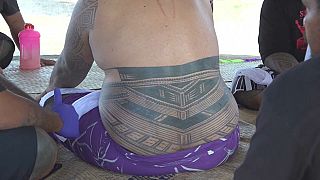
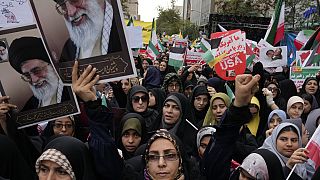
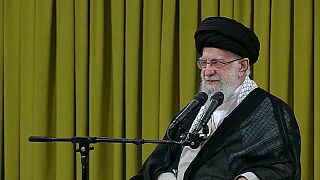
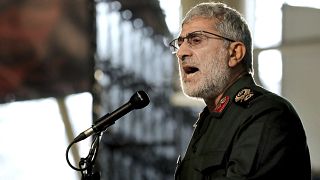

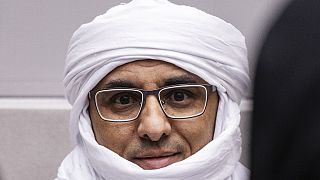
01:03
Iran shows off latest missiles and drones during army parade
01:09
US says it was not involved in Lebanon pager explosions which struck Hezbollah fighters
00:54
Iran's supreme leader opens doors to negotiations with U.S. over nuclear program
01:44
Gaza faces cash crisis as main banks halt operations
01:06
An Israeli airstrike on a Gaza school kills over 80 people
01:41
Israeli Olympic team receives threatening messages as tensions simmer over Gaza